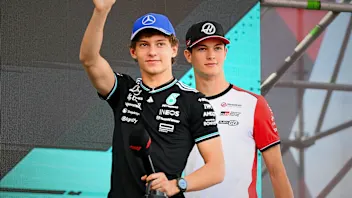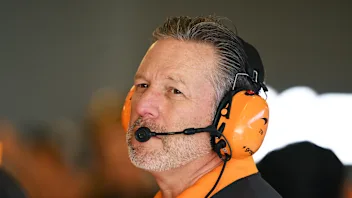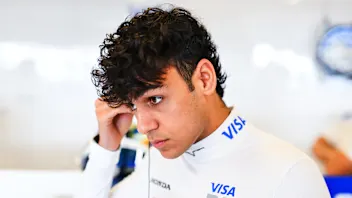Moments in time - the British Grand Prix
In our series exploring the history of Grands Prix through a selection of iconic images, we focus our lens on Great Britain, paying particularly close attention to Silverstone - the venue for the very first world championship race.
This look back through history takes in a British clean sweep of the podium, a dramatic nine-car pile-up, Williams’ first win, Mansell mania, and more…
Farina off to a flyer as the world championship gets underway, Silverstone, 1950
It was on a mild Saturday in May 1950 that the inaugural Formula One world championship began at a former RAF base in Silverstone. 21 cars took the start of the race, which was attended by the reigning British monarch, King George VI, and was officially designated the ‘The RAC Grand Prix d’Europe incorporating the British Grand Prix’. This picture shows the field leaving the grid on lap one with Juan Manuel Fangio (car number 1, front right) leading fellow Alfa Romeo drivers Luigi Fagioli (car number 3, front centre) and Nino Farina (car number 2, far left). Farina went on to win the race from Fagioli and Reg Parnell, whilst Fangio dropped out with an oil leak.
(© LAT Photographic)
Moss opens his account, but did Fangio help? Aintree, 1955
It’ll go down in history as one of the great unknowns in Formula One racing - did Juan Manuel Fangio (right) allow Stirling Moss (centre, dirty face) the honour of taking his first world championship victory in front of his home crowd at Aintree in 1955? The Argentine, who was both the reigning world champion and Mercedes’ team leader, always maintained that his young team mate was simply the better driver on the day, but to this day Moss - aware of Fangio’s fine character - remains unsure as to whether his great friend and rival let him win. What’s indisputable, however, is that the pair were in a class of their own on a day when Mercedes swept the first four places and Moss became the first Briton to win his home race.
(© LAT Photographic)
Clark completes perfect weekend as Brits sweep the podium, Brands Hatch, 1964
Nobody in history has completed as many Grand Prix weekend ‘grand slams’ (pole, fastest lap, win, lead every lap) as Jim Clark. The Scot scored eight in total, the fifth of which was wrapped up at his home event at Brands Hatch in 1964, but only after the Lotus driver had seen off the persistent challenge of Graham Hill in his BRM. But what made the race even more special for the home crowd was the fact that joining Clark (pictured here celebrating victory) and Hill on the podium was fellow Brit John Surtees. The trio had occupied the top three spots in the previous year’s event (albeit with Surtees ahead of Hill) and would do so again in 1965 - a truly remarkable achievement in what was a golden age for British racers.
(© LAT Photographic)
Stewart and Rindt’s dazzling duel, Silverstone 1969
Having won four of the first five races of the season, Jackie Stewart was justifiably expected to dominate at his home race in Great Britain - but Jochen Rindt, perfectly at home on Silverstone’s sweeping high-speed layout, had other ideas. Having left the rest of the field for dust, Rindt (pictured here beautifully drifting his no.2 Lotus 49B around Woodcote bend) and Stewart (following in the no.3 Matra MS80) indulged in a superbly respectful duel for the lead in which they traded places almost 30 times. Sadly the battle Stewart would later describe as ‘one of the best of my career’ was cut short on lap 46 when a sagging rear wing endplate sliced a tyre on Rindt’s car. The Austrian eventually came home fourth after an unscheduled pit stop, whilst Stewart went on to record his fifth win of the season, much to the delight of the home fans.
(© LAT Photographic)
Scheckter triggers first lap carnage, Silverstone, 1973
Silverstone’s layout was a lot less complicated in 1973 - it consisted of eight turns, most of which were taken virtually flat out. The rapid right-hander at the end of the lap, Woodcote, was perhaps the most daunting of the lot, and unlike today the drivers approached it at maximum velocity after a long blast down the Farm Straight. It was at this corner that Jody Scheckter inadvertently triggered a nine-car pile-up when he ran wide and spun at the end of the first lap of the 1973 British Grand Prix. Amongst those eliminated in the chaos created by cars trying to avoid Scheckter’s McLaren were the Marches of David Purley and Roger Williamson (car no.14 in the foreground of this shot), the Surtees of Carlos Pace, Jochen Mass and Mike Hailwood, both Shadow entries, the BRM of Jean-Pierre Beltoise and the Brabham of Andrea de Adamich. Amazingly, all were able to escape without serious injury, except the luckless De Adamich who not only sustained a broken knee and ankle, but was also trapped in his car for almost an hour before he was cut free by the marshals. When the race eventually got back underway, it was McLaren’s Peter Revson who took the spoils.
(© LAT Photographic)
Frank Williams oversees his team’s maiden victory, 1979
Having seen his original Frank Williams Racing squad swallowed up by Walter Wolf in 1976, Frank Williams was starting from the ground up when, in 1977, he founded Williams Grand Prix Engineering with ambitious young engineer Patrick Head. However, less than two years later and the team were race winners - and at their home event no less. The team’s Silverstone success was rooted in subtle modifications to the Cosworth-powered FW07’s underside. The car employed ground-effect aerodynamics, but they were only truly optimised ahead of the British round when a couple of aluminium panels were added to the floor. All of a sudden Williams were way out in front and though Alan Jones dominated qualifying, a water leak in the race meant that it was left to veteran Clay Regazzoni to deliver Williams’ maiden win. In this picture Frank Williams (white cap, sitting down) and Patrick Head (pictured to the right of Williams with a headset on) keep track of ‘Regga’s’ progress from the pit wall. The popular Swiss driver would eventually win by over 24s.
(© Sutton Images)
Mansell hunts down Piquet, Silverstone, 1987
The intra-team rivalry between Williams drivers Nelson Piquet and Nigel Mansell was notoriously fierce, and more often than not this led to some pulsating encounters on track. The intensity of the battle racheted up a notch at Silverstone in 1987 as Piquet sought to defeat Mansell on the Briton’s home turf. True to form, Piquet won a ding-dong battle for pole on Saturday, but on the Sunday Mansell was back to his brilliant best. With Union Jack-waving fans urging him on from every one of Silverstone’s packed stands, the moustachioed racer took the fight to Piquet for 35 laps until an unscheduled tyre change dropped him nearly 30s back from the Brazilian. But Mansell was not done yet and set off in furious pursuit of his team mate, setting a string of fastest laps along the way. With ten laps to go the gap had been cut to 7.6s and eight laps later - around the time this picture was taken - there was just 0.8s between the two FW11B-Hondas. All that was left was for Mansell to pass Piquet, which he duly did, selling the Brazilian a dummy down Hangar Straight before bravely diving inside at Stowe corner. It would go down as the defining performance of Mansell’s career.
(© LAT Photographic)
Hill and Schumacher clash, Silverstone, 1995
In 1994 the world title was decided in Michael Schumacher’s favour when he controversially turned in on Damon Hill at the last race in Australia, but that wouldn’t be the last on-track clash between the German and the Briton. The incident pictured here was the first of two comings together between the duo in the 1995, and occurred on the 45th lap of Hill’s home race at Silverstone. The two-stopping Williams driver had desperately been trying to make amends for losing the lead to Schumacher’s one-stopping Benetton (pictured left), and with drops of rain in the air, Hill decided the time was right for a move. As the pair rounded Bridge Bend it seemed that Hill was too far back to have a stab up the inside into Priory corner, but he tried it anyway, and after a brief lock-up he slammed into the side of Schumacher’s car, pitching both men into the gravel and out of the race. Schumacher’s team mate Johnny Herbert was the beneficiary on this occasion, inheriting the lead, just as he’d do later in the year when the pair clashed again in Italy.
(© Sutton Images)
Schumacher takes controversial win in the pits, Silverstone, 1998
Few races have ended in such bizarre circumstances as the 1998 British Grand Prix at Silverstone. The drama began when a safety car was deployed amid horrendous weather conditions, not long after race leader Mika Hakkinen had spun and damaged his McLaren on lap 42. With his sizeable lead to Michael Schumacher wiped out and his car now lacking downforce, it seemed only a matter of time before the Ferrari found a way past, and it duly took the lead not long after the re-start when Hakkinen slithered off the soggy circuit at Becketts. But the real drama was yet to come as mere laps from the chequered flag, Schumacher was issued with a stop-go penalty for passing Alex Wurz’s Benetton under the safety car. As Ferrari debated the decision with the stewards (Wurz was being lapped), Schumacher continued on his way, gradually building his lead over Hakkinen. Then on the final lap, as Schumacher looked set to cross the finish line, he made a sudden beeline for the pit lane, before - as this picture shows - parking up in his pit box. Ferrari had finally called their driver in to serve his penalty, but they’d done so in the knowledge that Schumacher would have to cross the finishing line - and thus win the race - before taking his penalty. Furious, McLaren protested the result and after more deliberation the stewards decided to add ten-seconds to Schumacher’s race time - a somewhat meaningless penalty given that the German had won by 22 seconds…
(© Sutton Images)
Hamilton walks on water, Silverstone, 2008
At times during the 2008 British Grand Prix the conditions seemed more suitable for a powerboat race than an F1 race, but while other drivers struggled to keep their cars on the road - Ferrari’s Felipe Massa spun no fewer than five times, while Sebastian Vettel, Jenson Button and Robert Kubica all spun off - Lewis Hamilton was in his element. The McLaren driver passed team mate Heikki Kovalainen for the lead on lap five and thereafter was never headed, surviving one downpour after another to win by well over a minute from Nick Heidfeld’s BMW-Sauber. "Today was not a physical challenge," Hamilton said afterwards. "It was just mental. I don't know how I've done it but I did it and that's the most important thing."
(© LAT Photographic)
Next Up
Related Articles
 10 ways to get your Formula 1 fix during the winter break
10 ways to get your Formula 1 fix during the winter break JacquesHow did the rookies do in their first F1 season?
JacquesHow did the rookies do in their first F1 season? Beyond The GridThe best of 2025, from Norris’ evolution to Brad Pitt’s ‘need for speed’
Beyond The GridThe best of 2025, from Norris’ evolution to Brad Pitt’s ‘need for speed’ Tsunoda's best moments in F1 as he departs the grid
Tsunoda's best moments in F1 as he departs the grid Brown insists McLaren ‘won’t change the way we race’
Brown insists McLaren ‘won’t change the way we race’ Marko ‘believed in me when others didn’t’ – Lindblad
Marko ‘believed in me when others didn’t’ – Lindblad